牛津译林版(2020)选择性必修第一册Unit 4 Exploring poetry Grammar and usage 课前词汇短语句型自主学习课件(17张PPT)
文档属性
| 名称 | 牛津译林版(2020)选择性必修第一册Unit 4 Exploring poetry Grammar and usage 课前词汇短语句型自主学习课件(17张PPT) |  | |
| 格式 | zip | ||
| 文件大小 | 1.7MB | ||
| 资源类型 | 教案 | ||
| 版本资源 | 牛津译林版(2019) | ||
| 科目 | 英语 | ||
| 更新时间 | 2021-11-27 15:31:23 | ||
图片预览


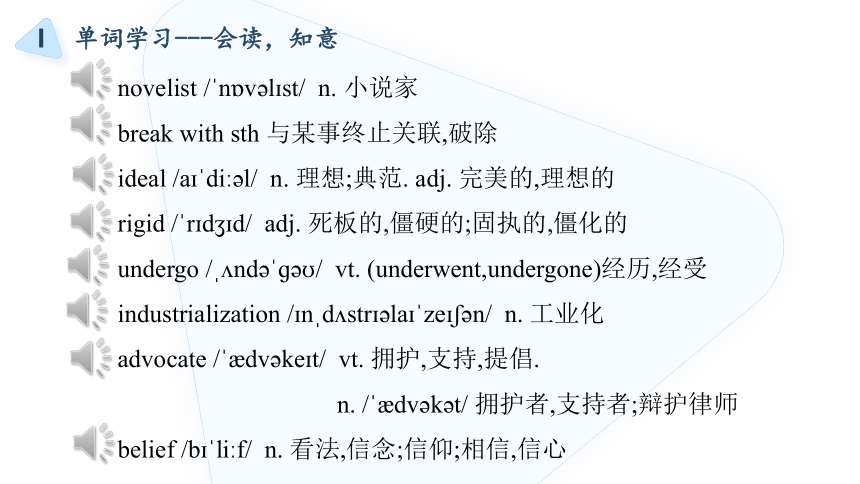
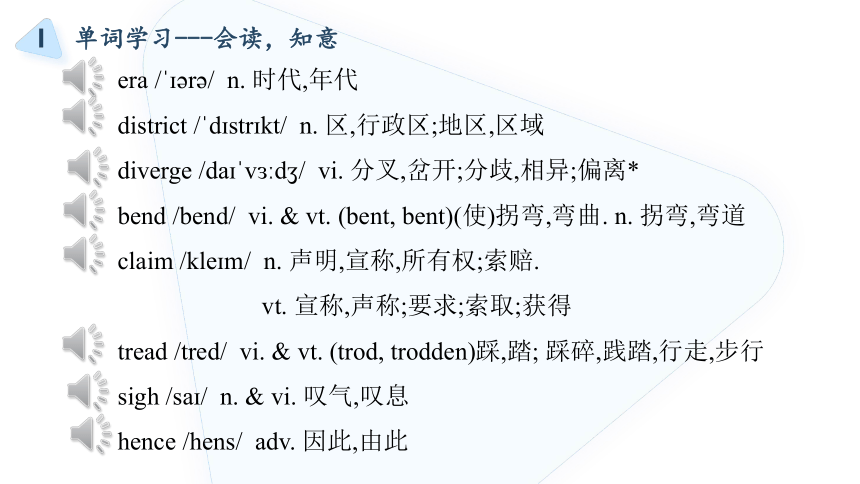
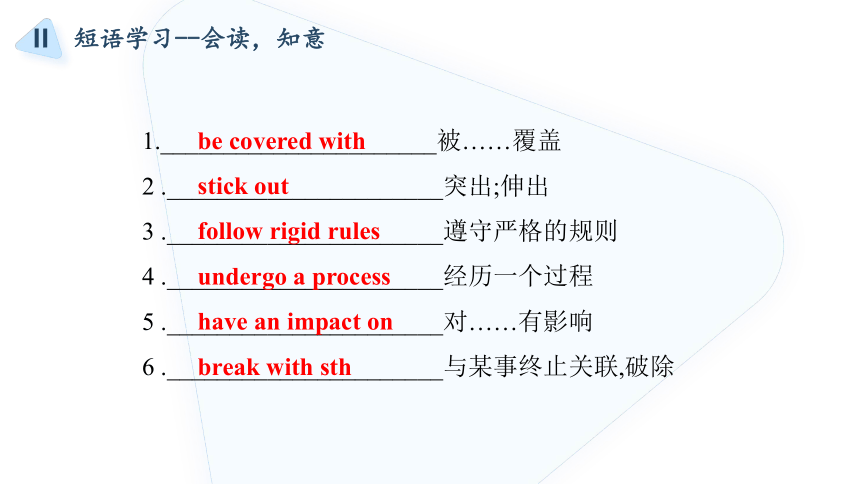
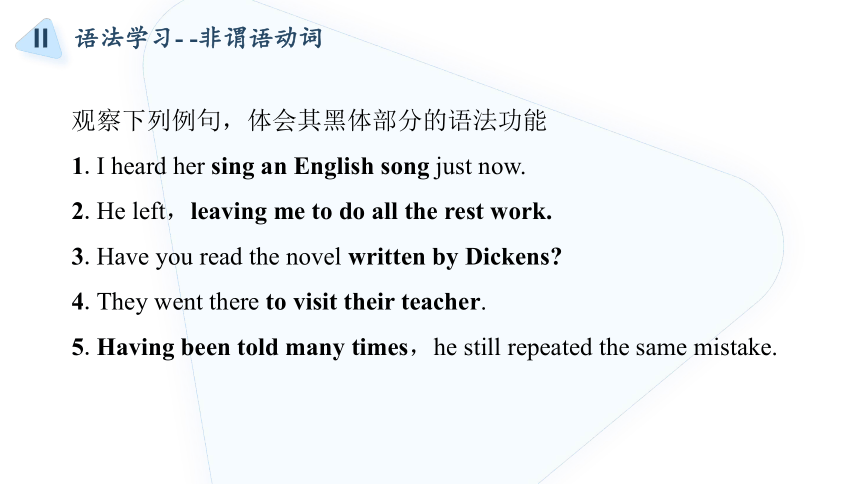
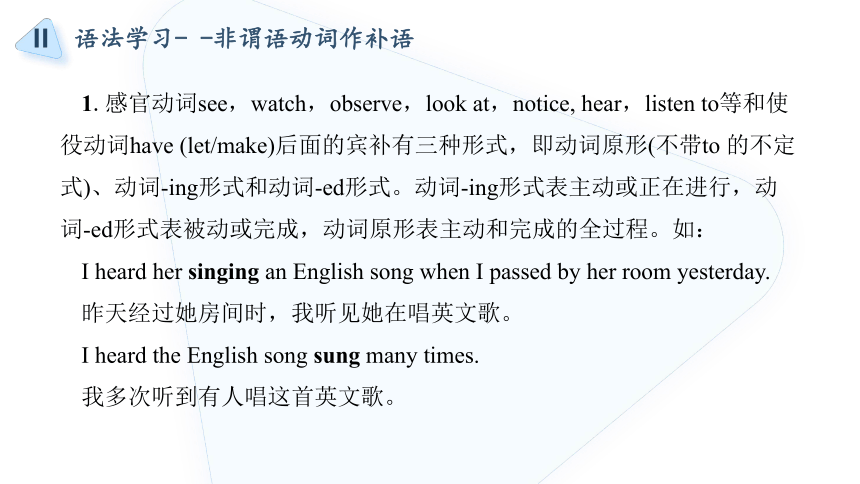
文档简介
(共17张PPT)
Grammar and usage
Unit 4 Exploring poetry
课前 自主学习
必备知识
单词
短语
句式
I
单词学习---会读,知意
novelist / n v l st/ n. 小说家
break with sth 与某事终止关联,破除
ideal /a di l/ n. 理想;典范. adj. 完美的,理想的
rigid / r d d/ adj. 死板的,僵硬的;固执的,僵化的
undergo / nd ɡ / vt. (underwent,undergone)经历,经受
industrialization / n d str la ze n/ n. 工业化
advocate / dv ke t/ vt. 拥护,支持,提倡.
n. / dv k t/ 拥护者,支持者;辩护律师
belief /b li f/ n. 看法,信念;信仰;相信,信心
I
单词学习---会读,知意
era / r / n. 时代,年代
district / d str kt/ n. 区,行政区;地区,区域
diverge /da v d / vi. 分叉,岔开;分歧,相异;偏离*
bend /bend/ vi. & vt. (bent, bent)(使)拐弯,弯曲. n. 拐弯,弯道
claim /kle m/ n. 声明,宣称,所有权;索赔.
vt. 宣称,声称;要求;索取;获得
tread /tred/ vi. & vt. (trod, trodden)踩,踏; 踩碎,践踏,行走,步行
sigh /sa / n. & vi. 叹气,叹息
hence /hens/ adv. 因此,由此
1.______________________被……覆盖
2 .______________________突出;伸出
3 .______________________遵守严格的规则
4 .______________________经历一个过程
5 .______________________对……有影响
6 .______________________与某事终止关联,破除
II
短语学习--会读,知意
be covered with
stick out
follow rigid rules
undergo a process
have an impact on
break with sth
观察下列例句,体会其黑体部分的语法功能
1.I heard her sing an English song just now.
2.He left,leaving me to do all the rest work.
3.Have you read the novel written by Dickens
4.They went there to visit their teacher.
5.Having been told many times,he still repeated the same mistake.
II
语法学习- -非谓语动词
II
II
语法学习- -非谓语动词作补语
1.感官动词see,watch,observe,look at,notice, hear,listen to等和使役动词have (let/make)后面的宾补有三种形式,即动词原形(不带to 的不定式)、动词 ing形式和动词 ed形式。动词 ing形式表主动或正在进行,动词 ed形式表被动或完成,动词原形表主动和完成的全过程。如:
I heard her singing an English song when I passed by her room yesterday.
昨天经过她房间时,我听见她在唱英文歌。
I heard the English song sung many times.
我多次听到有人唱这首英文歌。
II
II
语法学习- -非谓语动词作补语
2.注意在主动语态中用不带to 的不定式作补语,但在被动语态中要加上to。
3.不及物动词的过去分词作宾补只表完成和状态。如:
I looked down at my neck and found my necklace gone.(状态)
我低头看我的脖子,发现我的项链不见了。
I was surprised to find my hometown changed so much.(完成)
我惊讶地发现我的家乡变化很大。
II
II
语法学习- -非谓语动词作补语
4.leave 后接三种形式作宾补时,保留了原来之义“留下”,但表达的确切之义是“使……处于某种状态”。如:
It's wrong of you to leave the machine running.
你让机器一直开着是不对的。(主动,正在进行)
The guests left most of the dishes untouched,because they didn't taste delicious.
客人们没有动大部分菜,因为它们尝起来不可口。(被动,完成)
We hurriedly ended our meeting,leaving many problems to be settled.
我们匆匆忙忙地结束了会议,留下了很多问题等待解决。(被动,将来)
II
II
语法学习- -非谓语动词作定语
1.不定式作定语
(1)被修饰的名词或代词就是不定式的逻辑主语,在时间上一般表将来动作:通常用来修饰被序数词、最高级或no,all,any 等限定的中心词,以及不定代词。如:
I borrowed some books to read during my holiday.
我在假期里借了一些书看。
He is the best man to do the job.
他是最适合做这个工作的人。
II
II
语法学习- -非谓语动词作定语
另外,常用来修饰抽象名词。常见的有:ability,chance,idea,fact,excuse,promise,reply,attempt,belief,way,reason,moment,time 等。如:
Do you have the ability to read and write English
你有读写英语的能力吗?
I have a chance to go sight seeing.
我有一个去观光的机会。
II
II
语法学习- -非谓语动词作定语
2.动词 ing形式和动词 ed形式作定语
(1)动词 ing形式作定语表示主动的正在发生的事,动词 ed形式作定语表示已经发生的事或表示被动意义。如:
I have never seen a more moving movie.
我从未看过比这更感人的电影。
The houses being built are for the teachers.
正在建造的房子是给老师的。
The broken glass is Tom's.碎玻璃是汤姆的。
II
II
语法学习- -非谓语动词作定语
(2)作定语的不及物动词分词形式为:v. ing 表示正在进行;过去分词表示已经完成。如:
falling leaves 正在落下的叶子
fallen leaves 落下的叶子
boiling water 正沸腾的水
boiled water 沸腾过的水(白开水)
II
II
语法学习- -非谓语动词作状语
1.不定式作状语
He sat down to have a rest.(表目的)
He woke up only/just to find everybody gone.(表示结果)
在某些形容词作表语,表示喜、怒、哀、乐后跟不定式表示原因。
I am very glad to see you.我非常高兴地见到你。
在带有enough 或too的句子里,也常用不定式作状语,表示程度。
He was too excited not to say a few words.
他太激动了,不会不讲几句话的。
II
II
语法学习- -非谓语动词作状语
2.动词 ing形式和动词 ed形式作状语
(1)动词 ing形式和动词 ed形式作状语时,可以表时间、原因、结果、条件、让步、行为方式、伴随状况等。如:
Hearing the news,they got excited.(时间)
Be careful while/when crossing the street.(时间)
II
II
语法学习- -非谓语动词
单句语法填空
1.He walked out of the house,_________(follow) by his pet dog.
2. _________(dress)in white,she looks really pretty.
3. _________(see) the picture,I couldn't help thinking of the good old days.
4.Don't forget to _________ (lock) the door when you leave.
5.Deeply _________ (move) by the story,she began to cry.
followed
Dressed
Seeing
to lock
moved
Thank You!
Grammar and usage
Unit 4 Exploring poetry
课前 自主学习
必备知识
单词
短语
句式
I
单词学习---会读,知意
novelist / n v l st/ n. 小说家
break with sth 与某事终止关联,破除
ideal /a di l/ n. 理想;典范. adj. 完美的,理想的
rigid / r d d/ adj. 死板的,僵硬的;固执的,僵化的
undergo / nd ɡ / vt. (underwent,undergone)经历,经受
industrialization / n d str la ze n/ n. 工业化
advocate / dv ke t/ vt. 拥护,支持,提倡.
n. / dv k t/ 拥护者,支持者;辩护律师
belief /b li f/ n. 看法,信念;信仰;相信,信心
I
单词学习---会读,知意
era / r / n. 时代,年代
district / d str kt/ n. 区,行政区;地区,区域
diverge /da v d / vi. 分叉,岔开;分歧,相异;偏离*
bend /bend/ vi. & vt. (bent, bent)(使)拐弯,弯曲. n. 拐弯,弯道
claim /kle m/ n. 声明,宣称,所有权;索赔.
vt. 宣称,声称;要求;索取;获得
tread /tred/ vi. & vt. (trod, trodden)踩,踏; 踩碎,践踏,行走,步行
sigh /sa / n. & vi. 叹气,叹息
hence /hens/ adv. 因此,由此
1.______________________被……覆盖
2 .______________________突出;伸出
3 .______________________遵守严格的规则
4 .______________________经历一个过程
5 .______________________对……有影响
6 .______________________与某事终止关联,破除
II
短语学习--会读,知意
be covered with
stick out
follow rigid rules
undergo a process
have an impact on
break with sth
观察下列例句,体会其黑体部分的语法功能
1.I heard her sing an English song just now.
2.He left,leaving me to do all the rest work.
3.Have you read the novel written by Dickens
4.They went there to visit their teacher.
5.Having been told many times,he still repeated the same mistake.
II
语法学习- -非谓语动词
II
II
语法学习- -非谓语动词作补语
1.感官动词see,watch,observe,look at,notice, hear,listen to等和使役动词have (let/make)后面的宾补有三种形式,即动词原形(不带to 的不定式)、动词 ing形式和动词 ed形式。动词 ing形式表主动或正在进行,动词 ed形式表被动或完成,动词原形表主动和完成的全过程。如:
I heard her singing an English song when I passed by her room yesterday.
昨天经过她房间时,我听见她在唱英文歌。
I heard the English song sung many times.
我多次听到有人唱这首英文歌。
II
II
语法学习- -非谓语动词作补语
2.注意在主动语态中用不带to 的不定式作补语,但在被动语态中要加上to。
3.不及物动词的过去分词作宾补只表完成和状态。如:
I looked down at my neck and found my necklace gone.(状态)
我低头看我的脖子,发现我的项链不见了。
I was surprised to find my hometown changed so much.(完成)
我惊讶地发现我的家乡变化很大。
II
II
语法学习- -非谓语动词作补语
4.leave 后接三种形式作宾补时,保留了原来之义“留下”,但表达的确切之义是“使……处于某种状态”。如:
It's wrong of you to leave the machine running.
你让机器一直开着是不对的。(主动,正在进行)
The guests left most of the dishes untouched,because they didn't taste delicious.
客人们没有动大部分菜,因为它们尝起来不可口。(被动,完成)
We hurriedly ended our meeting,leaving many problems to be settled.
我们匆匆忙忙地结束了会议,留下了很多问题等待解决。(被动,将来)
II
II
语法学习- -非谓语动词作定语
1.不定式作定语
(1)被修饰的名词或代词就是不定式的逻辑主语,在时间上一般表将来动作:通常用来修饰被序数词、最高级或no,all,any 等限定的中心词,以及不定代词。如:
I borrowed some books to read during my holiday.
我在假期里借了一些书看。
He is the best man to do the job.
他是最适合做这个工作的人。
II
II
语法学习- -非谓语动词作定语
另外,常用来修饰抽象名词。常见的有:ability,chance,idea,fact,excuse,promise,reply,attempt,belief,way,reason,moment,time 等。如:
Do you have the ability to read and write English
你有读写英语的能力吗?
I have a chance to go sight seeing.
我有一个去观光的机会。
II
II
语法学习- -非谓语动词作定语
2.动词 ing形式和动词 ed形式作定语
(1)动词 ing形式作定语表示主动的正在发生的事,动词 ed形式作定语表示已经发生的事或表示被动意义。如:
I have never seen a more moving movie.
我从未看过比这更感人的电影。
The houses being built are for the teachers.
正在建造的房子是给老师的。
The broken glass is Tom's.碎玻璃是汤姆的。
II
II
语法学习- -非谓语动词作定语
(2)作定语的不及物动词分词形式为:v. ing 表示正在进行;过去分词表示已经完成。如:
falling leaves 正在落下的叶子
fallen leaves 落下的叶子
boiling water 正沸腾的水
boiled water 沸腾过的水(白开水)
II
II
语法学习- -非谓语动词作状语
1.不定式作状语
He sat down to have a rest.(表目的)
He woke up only/just to find everybody gone.(表示结果)
在某些形容词作表语,表示喜、怒、哀、乐后跟不定式表示原因。
I am very glad to see you.我非常高兴地见到你。
在带有enough 或too的句子里,也常用不定式作状语,表示程度。
He was too excited not to say a few words.
他太激动了,不会不讲几句话的。
II
II
语法学习- -非谓语动词作状语
2.动词 ing形式和动词 ed形式作状语
(1)动词 ing形式和动词 ed形式作状语时,可以表时间、原因、结果、条件、让步、行为方式、伴随状况等。如:
Hearing the news,they got excited.(时间)
Be careful while/when crossing the street.(时间)
II
II
语法学习- -非谓语动词
单句语法填空
1.He walked out of the house,_________(follow) by his pet dog.
2. _________(dress)in white,she looks really pretty.
3. _________(see) the picture,I couldn't help thinking of the good old days.
4.Don't forget to _________ (lock) the door when you leave.
5.Deeply _________ (move) by the story,she began to cry.
followed
Dressed
Seeing
to lock
moved
Thank You!
同课章节目录
- Unit 1 Food matters
- Welcome to the unit
- Reading
- Grammar and usage
- Integrated skills
- Extended reading
- Project
- Unit 2 The Universal Language
- Welcome to the unit
- Reading
- Grammar and usage
- Integrated skills
- Extended reading
- Project
- Unit 3 The art of painting
- Welcome to the unit
- Reading
- Grammar and usage
- Integrated skills
- Extended reading
- Project
- Unit 4 Exploring poetry
- Welcome to the unit
- Reading
- Grammar and usage
- Integrated skills
- Extended reading
- Project
